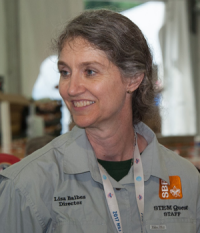
Lynn Andrews, Vice President, Strategic Marketing, CoorsTek
You have spent years leading teams. What have you learned about leading teams that other team leaders might find helpful?
I have been the beneficiary of principles applied by remarkable leaders during my career. Here are some of the most valuable leadership lessons I have learned:
- Clearly articulate the vision, objectives, and expectations and align all activities to the vision.
- Seek diversity of thought across the team, which will produce superior results.
- Give recognition, whether public or private, in the manner a team member prefers to receive it.
- Spread the praise (when things go right) and take the blame (accepting personal responsibility when things go wrong).
- Give timely feedback and graciously receive it.
- Be honest: do not promise something you cannot deliver. If you make a promise, you better deliver.
- Create win-win situations: a win for the individual (a stretch assignment, a high-visibility project) and a win for the organization (better performance and higher results).
- Admit mistakes and learn from them.
- Regularly re-recruit team members, reminding them of their contributions to the team.
- Practice cultural literacy.

Al Ribes, Human Resources Global Metrics Lead, Dow
What’s the secret to working well in a team environment, something employers of chemists these days view as an almost non-negotiable skill?
A shared purpose, respect for each other, trust, candid communication (engage in unfiltered conflict around ideas), commitment to decisions and plans of actions, hold each other accountable, and focus on achieving and celebrating collective results.

Lisa Balbes, ACS Career Consultant
Though you work primarily from your home office, no one can escape the consequences of the COVID-19 pandemic. In which ways has it most impacted your work?
I have been working from home for 28 years, so that part has not changed much – though the last several weeks have been “Working from Home – Extreme Edition.” I’ve had to get used to having other people in the house during my work day, and the changes that brings. Staking out different work spaces - that are not within hearing distance of each other - has made that easier.
The type of projects I’m working on have changed dramatically – preparing abstracts and posters for scientific meetings is all cancelled, and my travel schedule for teaching workshops is now completely clear through at least September, maybe longer. I have seen a small uptick in requests for help with grant proposals, and I’m expecting requests for peer-reviewed journal articles to increase, as researchers have more time to start drafting them.

Kevin Edgar, Professor, Virginia Tech Department of Sustainable Biomaterials
It can be a challenging time to be a mid-career chemist working in industry. You lived that life for a number of years before transitioning to academia. Any advice for your former mid-career industry colleagues who wish to continue to thrive professionally?
At one point, I was group leader over a large group of people with whom I felt very comfortable, directed at a topic right in my wheelhouse. Did that for 5 years, felt competent at it. Yet after 5 years it was time to do something else; my growth and that of the people in the group demanded it, despite our comfort with the status quo.
Seeking that change led me to working in a whole new field, on a startup business, with much more responsibility, and learning many things that benefit me and my students to this very day. Everyone’s situation is different. Some love making technical contributions in their field and enjoy doing that for an entire career. Some thrive on new challenges; for them a big company can provide those challenges, or they may need to change jobs to find what they need.
Chemists get remarkable training and have a wide range of skills; they rarely fully appreciate the range of skills they possess. Chemists are trained how to think about complex problems, investigate in detail what has been done before, formulate a plan of attack, including planning for contingencies, and carry out that plan. We are trained to recognize the limitations of our own knowledge, and to seek help from others when needed.
These and many other skills can serve us well in making new compounds, characterizing them, determining their properties – or in totally different endeavors that are only tangentially related to chemistry. So my advice would be, follow your passions without fear. Be ready to make changes and try new things; you are better prepared for them than you realize.

Lisa Houston, Vice President, PAC, LP
What non-technical skills are most essential for early career industry chemists to learn for long-term career success?
Written and oral skills are critical for success at any stage of a career but especially at the beginning. You must be able and willing to express your ideas clearly to a wide audience.
Teamwork/collaboration is also key - working well with others, being curious about what everyone on the team is working on to see the big picture, learning new things and offering insights and assistance. Finally, problem solving and troubleshooting skills will serve chemists well throughout their career.

Dawn Mason, External Innovation Manager, Eastman Chemical Company
How would you characterize the workplace environment for female chemists starting their careers today vs. when you began your career? What advice do you have for women chemists?
The number of women in chemistry has continued to grow. Today, the chances are good that you won’t find yourself as the only woman, or one of two women, in your entire department, and now you can usually find at least one female manager that you can turn to for perspective. This decreases the feeling of being an outsider and means that the female voice is now more likely to be heard.
That was not the case when I entered chemistry and even less so for women who are late in their careers. We owe gratitude to people like Marcetta Darensbourg and Dorothy Phillips and to the men who supported them. They provided a path for folks like me to have it a little easier, and hopefully that has been passed on and multiplied for the next generation. My current office environment consists of all women with advanced degrees, which would have been unheard of when I entered the workforce. (Yes, it is pretty awesome!)
There are definitely more women mentors than there used to be, but they are still in short supply, so find both female and male mentors. There are plenty of men out there who want to help you, too! Remember that feedback is a gift. It’s easy to get caught up in well-meaning, but negative feedback, and you should look for the truth in what you hear to make productive alterations to your behaviors, but don’t lose yourself in the process. You may do things differently, and that is just fine. At the end of the day, you have to have a great relationship with you or you won’t have great relationships with others.

Dorothy Phillips, Director-at-Large, 2014-2022
You have written about the importance of joining external organizations to advance one’s overall career development. Why do you think that’s important? How has your association with external organizations helped you?
Membership in external organizations enhances at least two important soft skills, leadership, and the ability to maximize networking opportunities. I set a goal early in my time at Waters to be the director of R&D (a move later to Marketing changed that goal). I knew that I would need to demonstrate strong leadership ability to achieve this goal.
My roles as chair of committees, and eventually as chair of the local section, followed by chair of a division in the American Chemical Society (ACS) raised the level of my leadership ability. In addition, through my participation in NOBCChE, ACS and Alpha Kappa Alpha Sorority, as well as Fisk United Methodist Church, I expanded my network greatly. I had links to aid in filling openings with qualified staff and to organize forums with Waters customers. I was able to link Waters and ACS through Project Seed and its national awards sponsorships. Membership in external organizations enhances your soft skills and expands your network or support base. I did achieve my goal as a Director in the consumable business.

Michael J. Nuwer, Quality and Training Steward, Occidental Chemical Corporation
What led you to pursue a PhD? Worth it? How would your career trajectory have differed without it?
I had not considered a PhD until the end of my junior year of undergrad. My best friend asked me what I was going to do after I graduate. I said, “Get a job.” He asked if I knew what someone with a bachelor’s degree in chemistry did in industry. I hadn’t a clue. He asked “Do you want to run experiments for someone or design them?” I said “Design them.” He told me I needed to go to grad school. Then he proceeded to tell me it was free and they would pay me a stipend. So was it worth it? Well, I rarely use my post graduate knowledge of chemistry. But yes it was worth it. I learned how to think on my own and question my thought process. I learned how to learn on my own and teach others. And in retrospect, it was some of the happiest, most fulfilling years of my life.

Alexia Finotello, Associate TS&D Scientist, Dow Chemical
What is the one personality trait that has been most instrumental in your career success? What trait do you wish you had in greater supply?
Resiliency. Science does not always work out as planned. Projects may change directions due to internal and external circumstances. Being able to course correct my project plans, my experiments, and even my career plans as new obstacles cross my path has been instrumental to my career success. It’s not always easy, but being able to adjust plans as needed helps me keep moving forward. The global pandemic has tested my resiliency skills in having to find new ways to work and help my son with school, all while being home all the time.
Drive to completion. I wish I had some more drive to finish tasks. I am great at getting started. It’s the excitement of something new to work on that gets me going. After some time working on a task (project, email, report, etc.), my perfectionism kicks in and with a little procrastination, I end up losing steam to cross the finish line. I wish I could take some of that starting excitement and use that energy to finish reports, emails or tasks with as much enthusiasm as I started with.

Mike Appell, Research Chemist, USDA National Center for Agricultural Utilization Research
What non-technical skills are most responsible for your career success, both with the USDA and in countless roles as an ACS volunteer?
Four non-technical skills most responsible for success in my career are a strong work ethic, problem solving skills, interpersonal skills, and the ability to be adaptable. Success is not easy, and a strong work ethic is necessary to overcome limitations and challenges. Problem solving skills can improve efficiency and enable new avenues to solve problems. Organizations are about people, and interpersonal skills can help gain acceptance to advance initiatives. Often, leaders are defined by how they address circumstances that arise beyond their control, and adaptability will allow a leader to best address those emerging issues.

Tiffany Hoerter, Assistant Director, Member Programs, ACS
So many people, including yourself, talk about the imperative to make sure they are ‘solving the right problem.’ How does one go about doing that?
My number one piece of advice is to listen before solving the problem. Listening before solving saves time, effort, and cost. It sounds simple, but people forget to listen all the time. Scientists are solvers, so we must be hyper aware of our tendency to provide a solution before hearing the details of the problem.

Matt Grandbois, Lead Market Manager, DuPont Electronics & Imaging
Having chaired the ACS Younger Chemists Committee, what insights would you like to share with industry managers/executives about what these early career chemists most value at the early stages of their careers?
In today’s world, the boundaries created by traditional institutions are more and more blurred. Early career chemists truly value organizations and leaders that create a compelling vision that inspires them to endure challenges, grow, and understand how their commitment and choices are creating more than just a company that they work for, but also a community that they believe in.
Within these environments, helping early career chemists understand how they can make an impact is also incredibly valuable. This starts with gently introducing company history, hierarchy, and institutional knowledge, but having an openness to the new ideas they bring. Early career chemists are a walking juxtaposition of confidence and insecurity, so teaching them how to stand on their own two feet as professionals when they just figuratively “learned to walk” in an industrial environment will help them recognize their strengths and to use them in effective ways that ultimately will help your organizations thrive.

Christina Bodurow, Vice President, Global Regulatory Affairs, Data Sciences, Safety & Regulatory, IQVIA
What’s the one trait that has been most instrumental in your career success?
After many years in the workforce, one learns that career success is the continuous layering on of a multitude of learnings, experiences, failures, successes and even sheer luck.
The trait that has helped me the very most through all of it was learning to be objective and balanced as much as possible. There are many facets to every problem, in research, in business, and in life. As you face each challenge, calmly onboard information, and think through multiple options or scenarios. It’s amazing how much insight can be gained by not jumping to conclusions, rather striving to be objective and balanced.

Thomas H. Lane, Retired, Dow Corning Corporation, Past President, American Chemical Society
It can be a challenging time to be a mid-career chemist working in industry. Any advice for current-day, mid-career industry colleagues working at places like Dow, DuPont, BASF, P&G, and other large companies, who wish to continue to thrive and advance professionally?
This is the best time in history to be a chemist. We live in a rapidly changing and challenging time that will require innovative solutions to problems that have not yet even been identified. Opportunities abound for those who are willing to focus, refine, and learn the skills required to meet the change we are facing.
Our industry is changing, as it always has, and reorganizations within our industry have become a constant. I know that during my 35-year career, it seems that every 18 to 24 months we either structurally reorganized or changed our management philosophy. As a young chemist, these changes were nerve racking; but with time, I realized that these changes seldom changed what I did, just who I told. This realization allowed me to remain focused on my research and not sucked down into the politics of the day. That is not say that I was never taken out of my comfort zone; I was! However, I refined the skills that needed upgrading and committed to learn everything I needed to be successful.
ACS played a critical role on my career journey. Like most, I often felt I was ready for new challenges before my management did. The excuse most often given for not expanding my role was that I did not have the experience needed for the job. My local section gave me the opportunity to develop some of those important experiences: leading without authority, budgets, project management, and so many more.
In addition to these opportunities to learn and serve, the Society has a tremendous suite of products and services for members who are just starting out or who are ready to make a change in their careers. I would direct those interested in help to www.acs.org/careers for additional information. This site provides information for both job seekers and employers. Job seekers will find career advice, updated salary information, access to continuing education resources, a place to post a resume, and ways to search the job bank. You can even listen to senior professionals talk about their careers and receive a few tips for success through the ACS Careers Industry Forum. The ACS Careers Blog is an interesting place to check out too.
However, one of the most important assets the Society has to offer a job seeker is ACS Network Chemistry Community Online. A great place to visit, especially the Profession and Career Development forums. The ACS Career Navigator is replete with valuable information too! The ACS Leadership Development Systems is a must for building and refining your management skills. It focuses on core leadership competencies and the curriculum includes both e-learning and in person courses.
Copyright 2021 American Chemical Society (All Rights Reserved)









